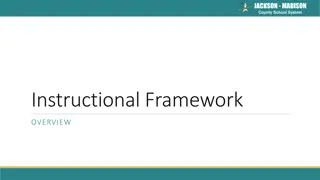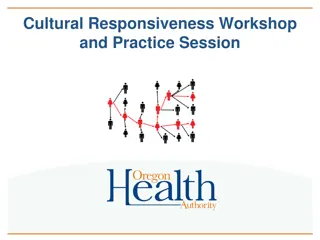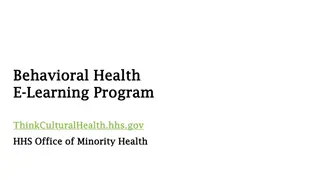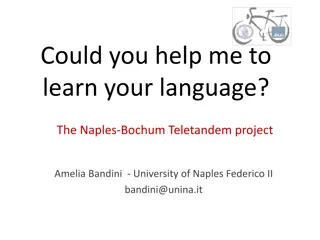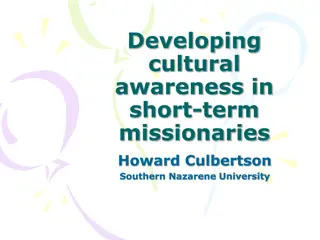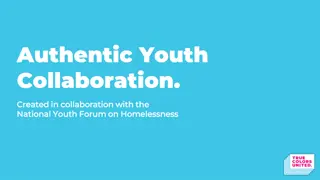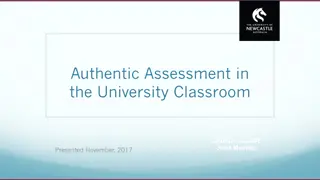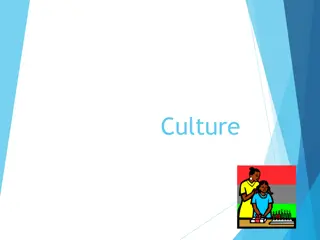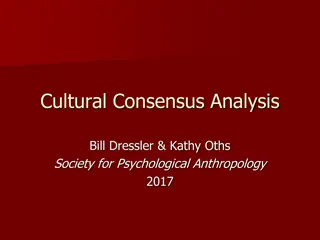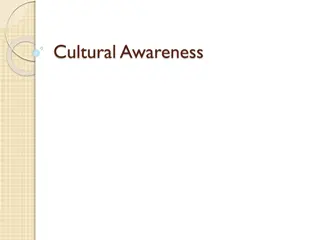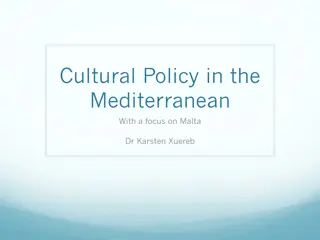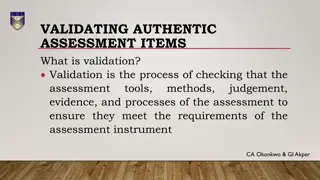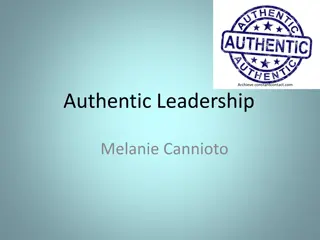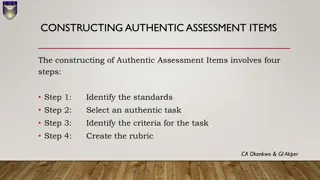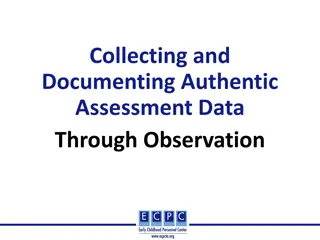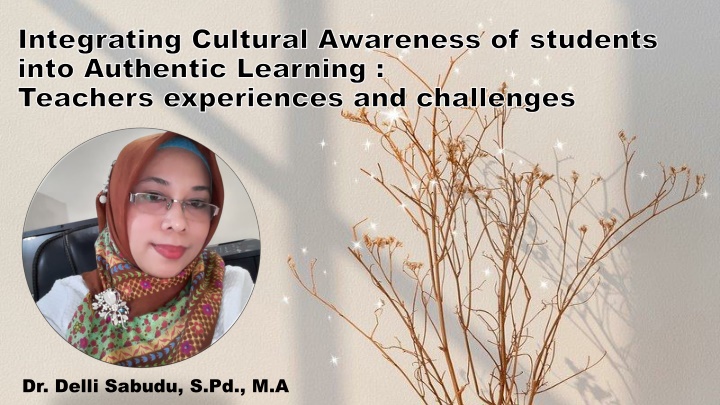
Cultural Awareness Challenges in Authentic Learning
Explore the experiences and challenges faced by teachers in integrating cultural awareness into authentic learning, aiming to enhance students' cultural understanding and competence. Discover the importance of cultural awareness in education and its impact on students and teachers.
Download Presentation

Please find below an Image/Link to download the presentation.
The content on the website is provided AS IS for your information and personal use only. It may not be sold, licensed, or shared on other websites without obtaining consent from the author. If you encounter any issues during the download, it is possible that the publisher has removed the file from their server.
You are allowed to download the files provided on this website for personal or commercial use, subject to the condition that they are used lawfully. All files are the property of their respective owners.
The content on the website is provided AS IS for your information and personal use only. It may not be sold, licensed, or shared on other websites without obtaining consent from the author.
E N D
Presentation Transcript
Integrating Cultural Awareness of students Integrating Cultural Awareness of students into Authentic Learning : into Authentic Learning : Teachers experiences and challenges Teachers experiences and challenges Dr. Delli Sabudu, S.Pd., M.A
INTRODUCTION INTRODUCTION Cultural understanding is a basis for competence-oriented general education especially connected to the students cultural awareness in authentic learning. Teachers are responsible for applied content and methods that are used to purposefully lead school students to that result.
CONTINUE CONTINUE Understanding cultural issues is important in current education. For example, it is declared by UNESCO as one of the key competences for lifelong learning, or as a result of competence-oriented education. In education different concepts related to the learning culture are used - cultural awareness (sensitivity to the similarities anddifferencesthatexistbetweendifferentculturesandtheuseofthissensitivityin an effective way), cultural competence (the ability to participate ethically and effectively inpersonal andprofessional intercultural settings), cultural literacy(the ability to understand and participate fluently in a given culture, critically reflect on, and if necessary bring changes in it). In this study, the term cultural understanding (the knowledge and understanding of experiences with one s own culture as well as others cultures that inform one s ability to navigate new experiences) is used, because it is the most common in Manadonesse tradition. The teacher is an agent for implementing the purposeful development of junior high schoolstudents culturalunderstandingandawarenessinactualschoollife.
WHY ? WHY ? So it may be said that cultural awareness is one of the important aspects of education according to UNESCO. Cultural awareness means sensitivity to the similarities and differences that exist between different cultures and the use of this sensitivity in an effectiveway Students with the same cultural background will interact more easily than those with differentbackgrounds, Teachers with students who have the same background will also interact and connect moreeasily Andeventeacherswiththesamebackgroundwillbeeasytointeractwith, The conditions like this often cause discomfort in the learning environment so cultural awareness needs to be raised and increased, especially in authentic learning where this learning involves more things that are actual and relevant to the lives of students and teachers.
AIMS : The aim of this study is to identify actual goals for the development of teacher education curriculum, professional development and teaching aids by investigating in-service teacher s challenges for the successful promotion of students cultural understanding focus on students cultural awareness in Junior high school. To meet the aim, 8 Moslems teachers in MTS Negeri I Manado and 8 teachers from State Junior high schools were asked to complete the data. Qualitative analysis of the data was performed to clarify their practices, beliefs and professional needs related to the problem.
RESULT RESULT The result showed that teachers are aware of the significance of personally meaningful learning for students and the importance of a positive atmosphere in the classroom. Their experiences of integrating the cultural issues in all school subjects and connecting the learning with actual situations and socio-cultural contexts life are at a much lower level (in the context of authentic learning) . A similar situation is with teachers experiences with the content of culture they mostly interpretcultureasbelongingtoart,ratherthanallhumanexpression. Thedatarevealedadifference between educators beliefsandknowledge andtheirrealpractices: 1. Teachers note the importance of active and self-directed learning, but common expressions that studentsarenotmotivatedtoshowthatitisnotimplemented effectively inpractice. 2.Teachers recognize the need to foster the development of contextual learning but do not dare to planandimplementthelearningprocessindependently andcreatively. 3.Teachers cultivate a positive atmosphere in the classroom but do not feel responsible for creating oneoutsidetheclassroom,incollaborationwithcolleaguesandschoolmanagement. It can be argued that there is a gap between what teachers think they know and do to achieve a transformative learningprocessandtheirrealcompetence toimplementitinpractice.
DISCUSSION DISCUSSION Respondents' practice can be interpreted as a traditional transmissive approach to promoting students cultural awareness. Teacher educators face a challenge in upgrading the teacher education curriculum, professional development, and teaching aids to reduce the gap between theoretical principles of transformative learning and teachers beliefs and practices related to promoting general school students cultural understanding. Possible solutions: 1.To realize inter- and trans-disciplinary studies in teacher education by purposeful integration of cultural issues and discussions about contradictory values in all study courses, not only in arts, language, and social sciences. 2. To promote the prospective teacher s cultural understanding through reflecting on personal experiences, involving the students in setting individual learning goals, as well as discussing the different meanings and cultural values that help the appreciation of the cultural context and the diversity of people s experiences. 3. To encourage the openness and creativity of future teachers by suggesting that they create and share with other students some original materials, like catalogs of lesson ideas or support materials for the organization of Junior High school students personally meaningful learning, linking them with their life experiences and authentic life events. 4. To cultivate a trustful, honest, straightforward, and respectful atmosphere in the Classroom.
CONCLUSION CONCLUSION In conclusion, it can be claimed that this research indicated aspects that teachers consider relevant as well as the main problems and gaps between theoretical principles recognized as essential by educational policy, and teachers beliefs and practices. Cultural awareness in authentic learning activity needs to be implemented well into practice so the learning purposes can be optimized achieved



